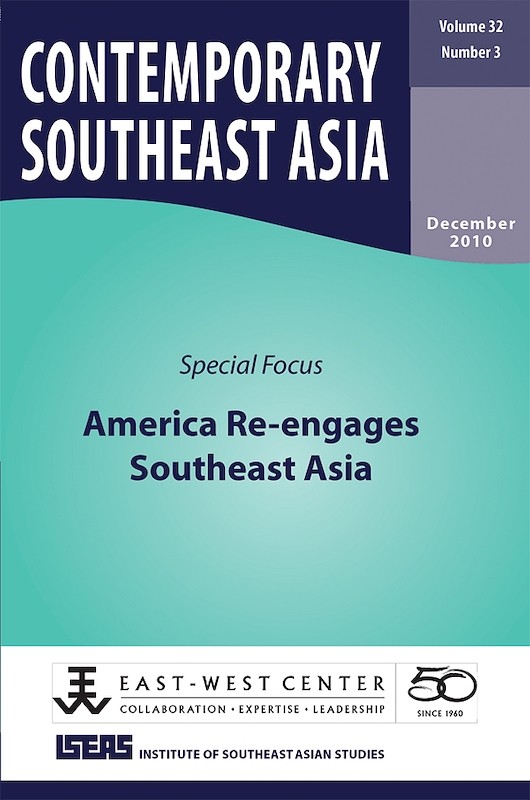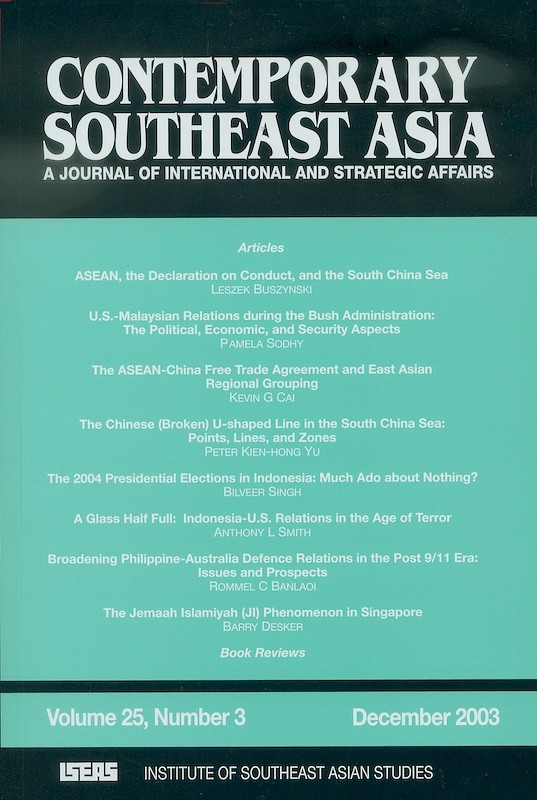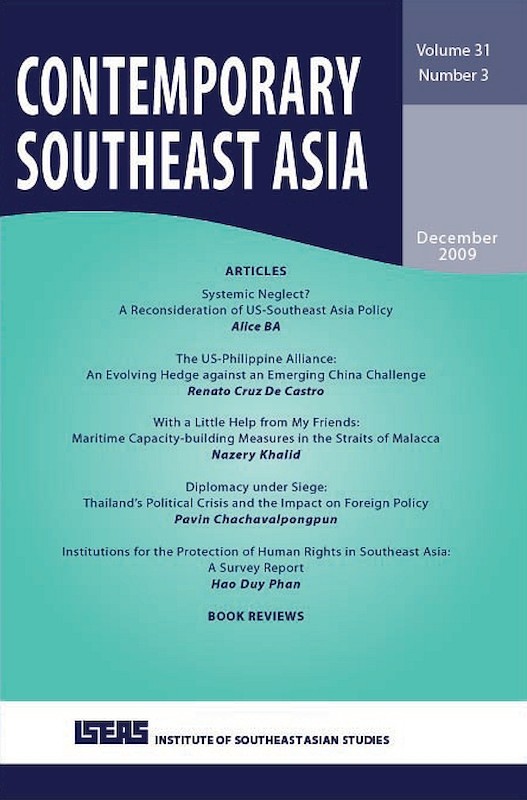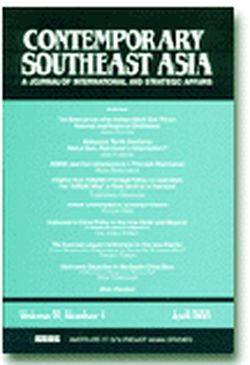Contemporary Southeast Asia: A Journal of International and Strategic Affairs Vol. 24/2 (Aug 2002)

Date of publication:
August 2002
Number of pages:
239
Code:
CS24/2
Contents
-
Contemporary Southeast Asia: A Journal of International and Strategic Affairs Vol. 24/2 (Aug 2002)
-
Preliminary pages
-
Civilizing the Anarchical Society: Multilateral Security Processes in the Asia-Pacific, by Ron Huisken, author see abstractThe Asia-Pacific is in the early stages of the sort of strategic transformation that in the past had produced acute tensions, high levels of armament, and a significant risk of serious conflict. The region closely exemplifies Hedley Bulls anarchical society, that is, states compete for power and influence in an international arena still relatively free of multilateral constraints. Trends in relations between the key major powers suggest that allowing security outcomes to be determined by the free play of the security market-place will be a high-risk strategy. A stronger determination to boost multilateral security processes, to take charge collectively, should be seen as a key element of a strategy to improve the prevailing odds attached to the security outlook for the Asia-Pacific.
-
Whose Agenda? Partnership and International Assistance to Democratization and Governance Reform in Indonesia, by Gordon Crawford, Yulius P Hermawan, authors see abstractThis article examines the Partnership for Governance Reform in Indonesia, described as an innovative co-operation arrangement among the Indonesian government, civil society organizations, the private sector and Indonesia's international development partners. It inquires into whose agenda prevails. Is there genuine national ownership, with subordination of external activities to locally-devised reform strategies, as claimed? Alternatively, is partnership merely the latest ploy to disguise international intervention and simultaneously accord it greater legitimacy? Such questions are addressed by two means: first, by exploring whether the Partnerships reform agenda coincides with the main challenges to sustained democratization in Indonesia; and secondly, by examining the structure and activities of the Partnership and whether Indonesian or international influences predominate.
-
Towards a Human Rights Regime in Southeast Asia: Charting the Course of State Commitment, by Maznah Mohamad, author see abstractThe contestation for a regional or national human rights regime involves nation-states battling against their domestic civil society and an international movement for a normative global order. This article draws out this dynamic by charting the course of state commitment to the issue. The initial discussion is on the prospect of a regional body such as ASEAN playing a more committed role in establishing this human rights regime. Has ASEAN, with its avowed stance on non-interference, responded favourably to the human rights challenge? The second discussion focuses on the four government-established national human rights institutions that exist in ASEAN. The article questions whether a human rights regime conflicts with the notion of a nation-state as envisioned by Southeast Asian governments.
-
Dragon on Terrorism: Assessing Chinas Tactical Gains and Strategic Losses After 11 September, by J Mohan Malik, author see abstractEvery major event in history has unintended consequences. A major unintended consequence of the U.S.-led war on terrorism has not only been to checkmate and roll-back Chinas recent moves at strategic expansion in Central, South, and Southeast Asia but also to tilt the regional balance of power decisively in Washington's favour within a short period of time, thereby highlighting how tenuous Chinese power is when compared to that of the United States. In this sense, 11 September 2001 should be seen as a major discontinuity or non-linearity in post-Cold War international politics. New strategic and political realities emerging in Asia put a question mark over Beijing's previous assumptions and beliefs. This article provides an assessment of China's tactical gains and strategic losses following the 11 September attacks on the United States.
-
The Role of Philippine-American Relations in the Global Campaign Against Terrorism: Implications for Regional Security, by Rommel C Banlaoi, author see abstractPhilippine support for the American-led global campaign against terrorism has reinvigorated Philippine-American relations. The two countries are presently involved in combating terrorism in the southern Philippines through a joint military exercise called Balikatan 20021. Reinvigorated Philippine-American relations have implications for regional security because an American military presence is re-established not only in the Philippines but also in Southeast Asia. When the United States withdrew its military forces from the Philippines after the termination of the Military Bases Agreement in 1991, it created a power vacuum in the region. The United States now finds it imperative to re-establish its presence in Southeast Asia because of reported Al-Qaeda activities in the region. However, China is wary of the U.S. military presence, arguing that it is intended to deter not only terrorism but also China's moves in Southeast Asia.
-
The Legacy and Lessons of the United Nations Transitional Administration in East Timor, by Paulo Gorjao, author see abstractBetween October 1999 and May 2002, UNTAET exercised sovereign control over East Timor, and the state-building mission was viewed by many as a test case of governance. Although bearing in mind its so-called uniqueness, the aim here is to evaluate UNTAET's legacy, and to highlight the lessons from this experience. After reviewing major events at different levels, the article argues that, as far as legacy is concerned, the evidence is mixed. UNTAET was neither an astounding success nor a complete failure. As to possible lessons, it is argued that the problems faced by UNTAET must be placed into two different categories: efficiency; and accountability and legitimacy. UNTAETs experience suggests that, while it is feasible to fully overcome the first kind of difficulty, it is only possible to attenuate the second type of constraint.
-
The Politics of Market Liberalization: A Comparative Study of the South Korean and Philippine Telecommunications Service Industries, by Dong-Yeob Kim, author see abstractThe market liberalization of the South Korean and Philippine telecommunications sectors were effected largely as a result of the shift in the international political economic paradigm towards neo-liberalism. The nature and content of the two countries market liberalization differed according to the domestic power structure involving the political players. Although democratization and globalization pushed the state to liberalize the industry, there were certain lingering expectations of the state to engage in the market. The role of the state is to make the liberalized market work properly and to protect people from arbitrary business behaviour. The state is obliged to create optimum conditions to develop the national economy and to increase peoples welfare. The state is also expected to improve its own domestic industry in line with global competition.
-
The National Reconciliation Process in Myanmar, by Maung Aung Myoe, author see abstractWith the release of Aung San Suu Kyi from house arrest in May 2002, hopes have been revived for an end to the political deadlock in Myanmar which has prevailed since the early 1990s. Both the ruling State Peace and Development Council (SPDC) and Aung San Suu Kyi have claimed that they have already gone beyond the phase of confidence-building and mutual trust. However, against the backdrop of past failures in the national reconciliation process, many analysts and observers on Myanmar affairs remain cautious. For a better appreciation and understanding of the current situation, this article provides an overview of the national reconciliation process in Myanmar, discusses factors that have contributed to the recent breakthrough and offers some general recommendations to ensure further success in the process.
-
Malaysia-Singapore Relations: Retrospect and Prospect, by K S Nathan, author see abstractThis article examines the historical foundations, key determinants and political economy of Malaysia-Singapore relations, and evaluates the significance of major issues in bilateral relations in recent times, namely, (a) water, (b) the location of immigration checkpoints, (c) the development of Malayan Railway land, (d) the use of Malaysian airspace by the Singapore Air Force, and (e) the repatriation from Singapore of pension funds of Malaysian employees. All of the above, as well as other issues, suggest that the bilateral relationship is characterized by both functional tension and co-operation. The article argues that the best methodological approach to analysing the progress of Malaysia-Singapore ties is offered by political realism which emphasizes self-help and prioritizes national political, economic, and security interests as the goals of foreign policy.
- BOOK REVIEWS
-
BOOK REVIEW: Politics in Southeast Asia: Democracy or Less. By William Case., by Michael J Montesano, author
-
BOOK REVIEW: Democracy in Malaysia: Discourses and Practices. Edited by Francis Loh Kok Wah and Khoo Boo Teik, by Surain Subramaniam, author
-
BOOK REVIEW: East Asia Imperilled: Transnational Challenges to Security. By Alan Dupont, by Paul Smith, author
-
BOOK REVIEW: Indias Emerging Nuclear Posture: Between Recessed Deterrent and Ready Arsenal. By Ashley J. Tellis, by Rouben Azizian, author






